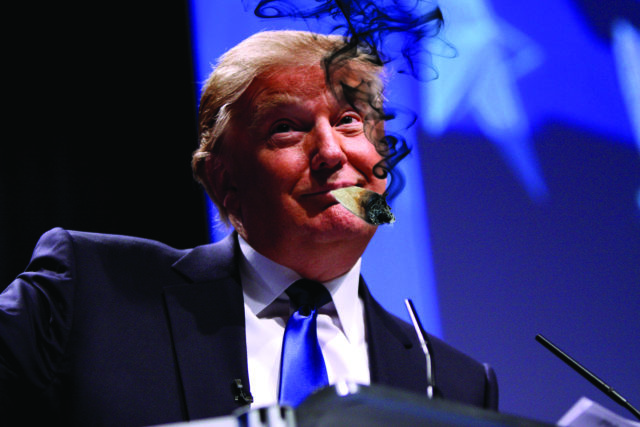
Will Donald Trump go to pot? Stranger things have happened.
I’ve been wondering about this for some time now. Will Trump de-schedule marijuana under the Controlled Substances Act by executive action?
There is not a shred of evidence in the news to suggest he’s contemplating doing so, and he probably isn’t. Still, it would be a brilliant political move going into the 2020 election, which is why it shouldn’t be ruled out.
First some background: It’s generally assumed that marijuana legalization on the federal level will require an act of Congress. But there’s a second way marijuana prohibition can be struck from federal law.
The Federal Controlled Substances Act, which currently lists marijuana as a Schedule I Controlled Substance, along with heroin, also contains a clause that authorizes the president to re-schedule or de-schedule marijuana by executive action.
In other words, Trump could remove pot from the list of prohibited drugs in the Controlled Substances Act with the stroke of a pen.
Here are some of the reasons why doing so would be good politics for him:
It would suck the oxygen out of what is rapidly becoming a major Democratic campaign issue. Except for Clueless Joe Biden, every Democratic presidential candidate has come out for legalizing marijuana or leaving the decision to the states. Democratic candidates throughout the country are viewing marijuana as an issue that will boost Democratic turn-out among millennial and Gen Z Americans.
If Trump were to de-schedule marijuana, the issue would be largely off the table for the 2020 cycle. Nixon used a similar strategy during the 1972 election to neutralize the issue of improving U.S. relations with China, which was a major foreign policy issue for Democrats. Nixon went to China in late February 1972, recognized the Communist regime as the legitimate government of China, and returned home owning an issue on which Democrats had been expected to campaign.
By de-scheduling marijuana, Trump would get a lot of conservative Republican candidates with pro-legalization constituents and an anti-legalization base off the hook.
De-scheduling pot might cause at least some younger voters, the demographic that is most hostile to Trump, to give him a second look. At the very least it might take the edge off some of the hostility.
De-scheduling would also allow Trump to deliver on an issue that resonates with a lot of black and Hispanic voters. It would fit with Trump’s narrative that the Democrats promise a lot while campaigning in the black community and then fail to deliver.
De-scheduling marijuana would come with minimal political risk. Anti-marijuana Republican voters might not like it, but he would lose very few GOP votes over the issue. Who else would they have to vote for?
In short, if Nixon could go to China, Trump could go to pot. Whether he will remains to be seen, but it’s fun to speculate.
• • • •
And yet another record is set. The Colorado Department of Revenue is reporting that dispensaries racked up $152 million in sales in June, a new high. The haul was up by more than $9 million from May, which also saw record sales.
Earlier, the Revenue Department issued a release announcing that the “average market rate” for a pound of marijuana in Colorado during the second quarter of the year was $850 a pound “for bud” (aka flower), which works out to $53.13 cents an ounce.
The wholesale price was up from $806 in the first quarter.
The average market rate for trim, on the other hand, dropped to $325 a pound in the second quarter, a $100-a-pound decline from the first quarter, according to Department data.
The average market rates are “the median market prices of each category of unprocessed retail marijuana.” The average market rate is calculated quarterly for use in levying the state’s marijuana excise tax.














